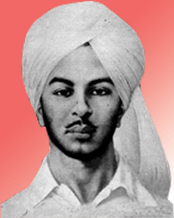
Archive 2009
|
September 16-30, 2007
 The life and struggle of Shahid Bhagat Singh continue to inspire our youth! The life and struggle of Shahid Bhagat Singh continue to inspire our youth!
No matter, if your Government tries and succeeds in winning over the leaders of the upper strata of the Indian society through petty concessions and compromises and thereby causes a temporary demoralization in the main body of the forces. The war shall continue. It may assume different shapes at different times. It may become open, hidden, purely agitational, or fierce life and death struggle. The choice of the course, whether bloody or comparatively peaceful, rests with you. Choose whichever you like. But that war shall be incessantly waged with new vigour, greater audacity and unflinching determination till the Socialist Republic is established. Till the present social order is completely replaced by a new social order, based on social prosperity and thus every sort of exploitation ends and humanity is ushered into the era of genuine and permanent peace. The days of capitalist and imperialist exploitation are numbered. The war neither began with us nor is it going to end with our lives. It is the inevitable consequence of the historic events and the existing environments. These words were among the last penned by Shahid Bhagat Singh before he walked to the gallows, confident that the people of India would continue, and finally win "the war." This letter was addressed to the Governor General in India, the tip of the spear of British colonialism in the country. Bhagat Singh had been sentenced to death for killing a British officer as revenge for the brutal assault on Lala Lajpat Rai, that led to the old freedom fighter’s death. Along with his comrades – brothers as he called them – Sukhdev and Rajguru, he was to be hanged for treason against a King he had never accepted. As the world celebrates the hundredth birth anniversary of this great martyr, these words still hold a message - and a challenge for the youth of today. India gained independence from the British Empire in 1947, but the dreams of Bhagat Singh and his feisty comrades, as seen by the words of this letter, have remained unrealised. At the young age of 24, on the cusp of martyrdom, he was letting the British know that he understood the power games they were playing with the Indian elite. He understood that the Indian National Congress led by Mahatma Gandhi was compromising the vision of freedom that ordinary Indians held through deals with the British. Deals through which the Congress "led" the independence struggle only to borrow the former coloniser’s Westminster model of "democracy" and embrace the capitalist laws that were behind the country’s plunder for two centuries that Britain ruled over us. Three questions come to mind on reading this crucial letter. How did a young Bhagat Singh, understand the present and foresee the future in a manner that appears nothing short of clairvoyance? The answer lies in the science of Marxism-Leninism, which he had ardently studied, discussed and debated. He had sacrificed his life, and was facing death for striving for a revolution that was nowhere in the immediate horizon. Wouldn’t it be natural for him to, at least now, question the success of the revolution he dearly believed in? What if he had been wrong all along? How could he continue to call the revolution “inevitable”? Once again the answer lies in Marxism Leninism. The science had taught Bhagat Singh that the revolution, and the victory of socialism over capitalism, could not be stopped. Nor had he failed in his mission. Far from it – every little detail of the period prior to his death had been carefully planned and skillfully executed. He and his comrades in the Hindustan Republican Socialist Association had shaken the British empire to a stage that they had to pass the Arms Act – meant to curb the spread of weapons among the revolutionaries – through an ordinance. With the whole of India closely following the trial in the British officer’s murder, Bhagat Singh and his comrades used the open court as a forum to speak to Indians, and ignite a revolutionary spirit in them. When the British got wise to the aims of the revolutionaries, they were forced to drop the charade of “law and justice”, and hurriedly convicted and sentenced them while banning them from court. The revolutionaries were thus able to expose the tall claims of justice that the British claimed to uphold. Not at all. In fact, Leninism teaches us that imperialism is the last stage of capitalism, it is capitalism that is rotting. And over the decades since Bhagat Singh wrote this letter, the moribund features of imperialism has only become further accentuated. All the illussions promoted by the ideologues of capitalism of a world without wars, of capitalism acquiring a "human face", of capitalism without the plunder of nations and peoples, have been proven to be just that — illussions to somehow safeguard the imperialist system from the revolution. It follows that a system that has reached stagnancy must go. And like Bhagat Singh, it is the youth who have to once again take the initiative. |
